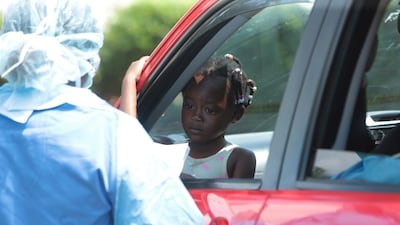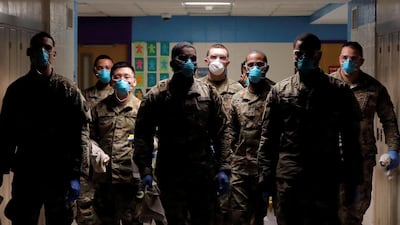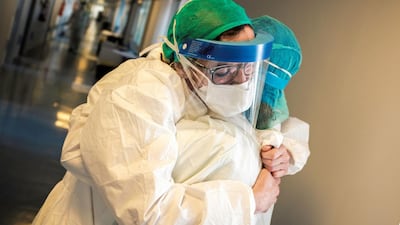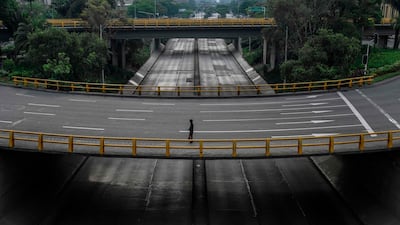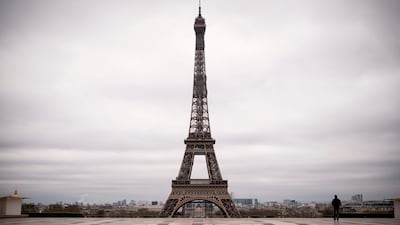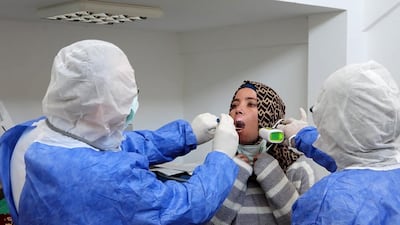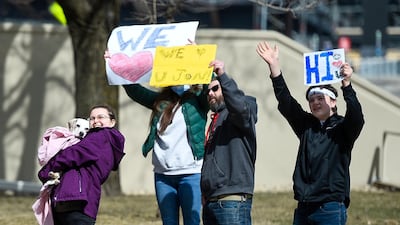The community of "preppers" in the US has been gently mocked over the years for stockpiling items such as canned food, bandages, torches and face masks, bracing for a doomsday-style calamity that could ravage the country.
What difference a few weeks can make. With coronavirus spreading through New York, San Francisco and other cities, and shoppers queueing for hours outside supermarkets to buy toilet paper, preppers are now ahead of the pack.
As parts of the US go into effective lockdown, preppers say the outbreak could push prepping into the mainstream and away from smirk-inducing stereotypes of gun-hoarding rural libertarians.
For Jason Charles, a fireman and one of New York CIty's most thoughtful preppers, the coronavirus pandemic is not an "I told you so" moment. Its threat should be neither exaggerated nor downplayed.
"Don't panic. It's serious, but it's not end-of-the-world serious," he told The National.
Mr Charles, 42, began prepping a decade ago after reading a novel about terrorists firing an electromagnetic weapon that sends America into the Dark Ages. Now, he stocks enough food to keep his wife and two teenage children fed for a year.
His "bug-out bags" contain radios, sleeping pads, ready-to-eat meals, camping cookers, torches and a fire-starting fungus that lasts far longer than flint. He even packs a crossbow for hunting rabbits.
There were few signs of panic on New York City streets, but the queues outside supermarkets suggested people were panic buying. City officials described a fast-spreading contagion, with more than 10,500 confirmed cases and about 100 deaths.
Mr Charles has been topping up his supplies of painkillers and other over-the-counter medicines, anticipating a city-wide lockdown by a government that, for many, arrived late to the crisis.
"People are getting ready, but are going about it the wrong way, rushing out to buy food and a million rolls of toilet paper and causing these shortages. They should have stored up, gradually, months ago," Mr Charles said.
Otherwise, an eerie stillness has descended on the "city that never sleeps". New York's world-famous Broadway shows, sports events, concerts, bars and restaurants have all shut. Many pedestrians and subway commuters wear masks and gloves.
Anna Bounds described herself as merely a "prepper-light". Still, she was smart enough to stock up on hand sanitiser and antiseptic wipes well before they shot up in price or became difficult to find on Amazon.
Ms Bounds, a sociology professor at City University of New York, said devil-may-care city denizens were learning that keeping frozen ready meals at home is a good idea for the day that Grubhub, a popular food delivery app, goes offline.
Ms Bounds entered the prepping world after past calamities. She recalls fumbling in darkness without a torch during a blackout in 2003 that lasted for days and being forced to seek refuge in a hotel after Hurricane Sandy struck in 2012. The 9/11 attacks also cast a long shadow.
"We're a global, gateway city," she said. "For New Yorkers, prepping is going mainstream. It's not a fantasy land of zombies or doomsday catastrophes. It's basic risk management and developing a plan for keeping your family safe."
She draws a line between New York's "urban preppers" – a community of problem-solving men and women of all backgrounds – and the typically white, male, gun-toting survivalists found in more remote, conservative parts of the country.
In her book, Bracing for the Apocalypse, which is scheduled for release in June, Ms Bounds explores a growing "survivalist subculture" of everyone from doctors to subway conductors that is worlds apart from go-it-alone libertarians from states such as Montana and Texas.
"It's not this lone white guy who's worried that the government's coming for him," Ms Bounds said. "In the city, it's everyone, including people of colour, who think very differently. They're prepping because they think the government isn't coming for them."
The trend is writ large, Ms Bounds said. Last year, daytime TV star Oprah Winfrey featured a $395 (Dh1,450) luxury bug-out bag containing headlamps, water purification pills and an emergency whistle on her annual list of gift ideas.
Prepping has also underscored some of the most popular TV in recent years, from the Robinson Crusoe-style reality show Survivor to the saga of those left breathing after a zombie apocalypse in The Walking Dead.
In true New York-style, the mega-rich are also prepping, Ms Bounds said. Ever more billionaires are having safe rooms built into their apartments to offer protection during break-ins as well as some natural and man-made disasters.
While metropolitan preppers distinguish themselves from their rural counterparts, they are still motivated by the same scenarios of nuclear war, terrorist attacks, hurricanes and pandemics such as coronavirus, with more than 340,000 confirmed cases and about 15,000 deaths globally.
Beyond the fear of calamities is the darker worry about how people behave in the aftermath. A year-long drought is scary, but nothing compared with a mob of hungry people turning on itself for the last remaining scraps of food.
For this reason, Mr Charles keeps one eye on coronavirus and the other on the economy, with stock markets tumbling this week.
"The stock market will continue to drop, we're going to see job losses, that'll cause a rise in crime and that's when we start to see break-ins and everything else that comes along with a bad economy," Mr Charles said.
While urban preppers may not keep gun chests in their pokey Manhattan apartments, the conversation at prepping meetings often turns to how best to defend yourself and your family.
“This is going to get a lot worse before it gets better,” he said. “Prepping is an insurance policy. Once you’re prepared, you start to worry less.”



